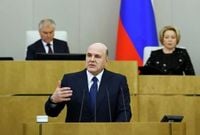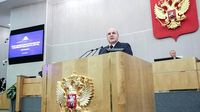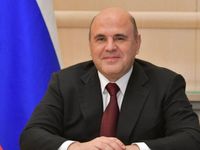On March 26, 2025, Mikhail Mishustin, the Chairman of the Government of the Russian Federation, presented the annual report of the government to the State Duma, outlining significant achievements and future plans amid ongoing economic challenges. This meeting, attended by members of the Duma, leaders of regional legislative bodies, and representatives from various sectors, including unions and educational institutions, highlighted the collaborative efforts to tackle systemic issues as directed by President Vladimir Putin.
During his address, Mishustin emphasized that the government, in conjunction with parliamentarians, has successfully navigated serious economic pressures, stating, "In the face of growing external pressure, we, together with you, dear deputies, under the leadership of the President, have taken all necessary measures to overcome serious challenges — to assist citizens, regions, and businesses, and to ensure the dynamic development of Russia." He expressed gratitude to the parliament for supporting government initiatives.
One of the key highlights of the report was the impressive growth of the Russian economy, which, according to Mishustin, has outpaced global averages for the second consecutive year. "Our GDP for 2024 exceeded 200 trillion rubles in nominal terms, nearly doubling since 2020," he noted. This growth has been primarily driven by an increase in domestic demand, both investment and consumer, making the economy more technological and diversified.
Mishustin also reported a remarkable rise in real incomes, which increased by approximately 8.5%, while the unemployment rate dropped to a historical low. "Last year, federal budget revenues grew by more than a quarter, allowing us to fulfill social obligations and support new promising projects," he added.
In light of President Putin declaring 2024 as the Year of the Family, the government has implemented several measures aimed at enhancing support for parents raising children. The national project 'Demography' continues to provide maternity capital, which can be accessed immediately upon the birth of the first child. Options for using maternity capital are being expanded, and since its introduction, around 14.5 million certificates have been issued.
From June 2026, a new mechanism will allow working parents with two or more children whose income is below 1.5 times the regional subsistence minimum to apply for an annual payment that will amount to more than half of the personal income tax they have paid. This support is expected to benefit four million families raising approximately ten million children.
Mishustin detailed various federal measures to support families, including increased tax deductions and a subsidy of 450,000 rubles for mortgage repayment, which was utilized by nearly 160,000 families last year. This subsidy has been extended for families having their third and subsequent children until the end of 2030. Mishustin assured that systematic efforts to assist parents are ongoing at all levels of government.
Furthermore, the report addressed the government's commitment to the well-being of participants in the special military operation (SMO) and their families. Mishustin stated, "Ensuring the welfare of our defenders and their families is an absolute priority for the government." He mentioned that the government is working swiftly to implement new proposals from the President regarding support for those engaged in the SMO.
Among the existing support measures for SMO participants and their families, Mishustin highlighted priority access to medical care and education, along with automatic monthly cash payments to war veterans, which are assigned without requiring additional applications. Benefits have also been established to exempt defenders and their families from property taxes and certain fees.
In terms of healthcare, Mishustin noted ongoing efforts to enhance access to high-tech medical treatments for all citizens. He reported that over 1.5 million high-tech operations were performed free of charge last year, emphasizing the importance of timely medical interventions. Additionally, nearly all newborns undergo expanded neonatal screening for 40 pathologies, contributing to the lowest infant mortality rate in Russia's history.
Addressing the issue of workforce shortages in healthcare, Mishustin reported a net increase of 12,000 doctors over the past two years and stressed the importance of fair compensation for these professionals. He also pointed out that Russia ranks among the top ten countries in terms of education quality and highlighted the need for the education system to align with labor market demands.
To meet future challenges, the government has adopted a five-year plan for the personnel needs of the Russian economy, which will guide the allocation of budgetary places in educational institutions. Mishustin revealed that over 700 educational and production complexes have been opened in 68 regions, allowing high school students to acquire vocational skills before graduating.
In addition, the 'Priority-2030' program has been extended for another six years, focusing on training specialists for every Russian region. This initiative has already attracted 3,500 students from other regions to universities in the Far East.
The government is also prioritizing the development of modern infrastructure. Under the national project 'Infrastructure for Life,' approximately 580 million square meters of housing have been constructed, significantly improving living conditions for millions of families. The social gasification program has connected about one million private homes to gas supply, while over 800,000 people have relocated to new, comfortable housing.
Moreover, Mishustin reported that around 25,000 kilometers of roads were built and repaired in 2024, with a significant portion of regional and urban roads meeting modern standards. The government is also actively addressing the agricultural sector, with 538 billion rubles allocated for support in 2025, aiming to enhance the profitability of agricultural enterprises.
As part of the systemic approach to managing price increases, the government has taken measures to stabilize the domestic market and ensure a balance between supply and demand. Mishustin concluded his report by reiterating the government's commitment to fostering a competitive and technologically advanced agricultural sector, which continues to achieve record harvests each year.






